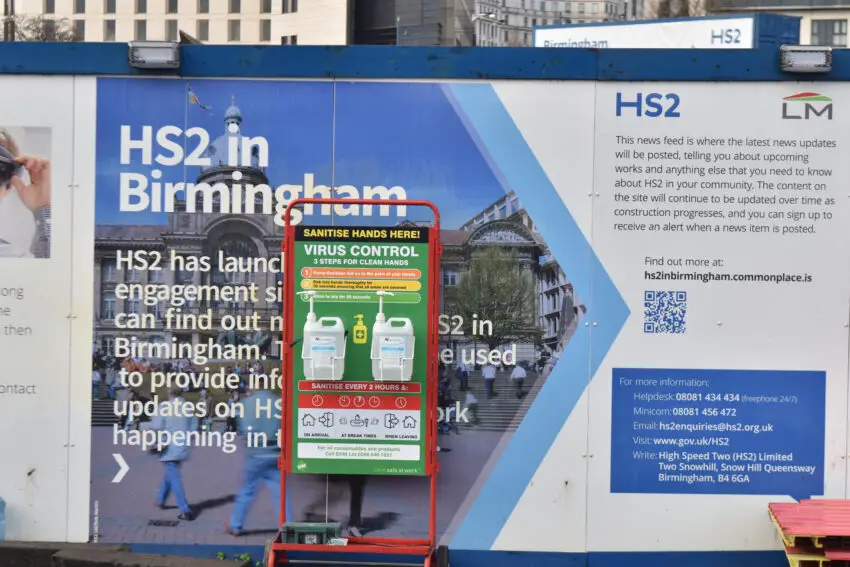HS2 has revealed that downgrading the high-speed rail project has resulted in over £2bn in costs. This financial burden emerges from significant write-offs and reduced future earnings.
Meanwhile, political and regional reactions continue to ripple through the UK as the ambitious project scales back. This report delves into the multifaceted impacts of the decision.
Massive Write-offs Due to Downgrade
HS2 has revealed more than £2bn in costs linked to Rishi Sunak’s decision to downgrade the high-speed rail line. The project’s scope change has led to significant financial implications.
The company has written off £1.1bn in costs from “phase two,” which was supposed to connect Birmingham to Manchester. This phase was scrapped by the government last year.
Additionally, £1bn in accounting charges show up in the project’s reduced ambitions, lowering expected future income. Overall, the railway’s scale-back has resulted in £2.17bn in one-off costs.
Political Impact of the Downgrade
Sunak cancelled the second part of the HS2 project and scaled back plans for London Euston station in October last year during the Conservative party conference in Manchester. Many viewed this decision as a political mistake, particularly in Manchester, where the new rapid link was highly anticipated.
The HS2 project has faced long delays and rising costs, causing its estimated price tag to balloon to £71bn. By scrapping part of the line, the government claimed it would save £36bn, with Sunak promising to reinvest the savings into other rail projects to improve links between northern cities.
Originally planned as a Y-shaped line linking London with Manchester and Yorkshire, HS2 has been scaled back over time. Boris Johnson’s government had already cancelled plans for HS2 to reach Leeds in November 2021.
Regional Reactions and Consequences
The decision to end HS2 in Birmingham has angered many regions that were set to benefit from the project. Keir Starmer acknowledged in January that Labour would not reverse this decision, stating it was “not possible.”
The National Audit Office recently noted that cancelling HS2’s second leg likely means higher fares on the west coast mainline from London to Manchester. This is intended to discourage train travel.
HS2 was meant to relieve capacity on the line, but now the NAO warns there could be 17% fewer seats on trains between Birmingham and Manchester due to stopping the line in the Midlands.
Financial Breakdown of Write-offs
HS2 attributed £850m of asset write-downs to cancelling the Birmingham-to-Manchester route. This means the company no longer expects economic benefits from the preparatory work for these phases.
This figure excludes land and property purchases, which the company hopes to sell later. It also reported a loss of £1.07bn from the cancelled phase two project, including design, legislation preparation, and environmental works.
An additional £95m in costs will come from winding down the project, such as remediation and ensuring work stoppage is safe.
Prospects of Cost Recovery
Theoretically, some taxpayer costs could be recouped. This might be possible by redirecting funds to other areas of the rail network or if a future body revives the Birmingham-to-Manchester line or the originally larger plan for Euston station.
The annual report also revealed that HS2’s former chief executive, Mark Thurston, was paid £652,569 in his final year, including a £34,345 bonus. Thurston resigned in 2023 after six years. At that time, HS2 was still expected to extend to Crewe and Manchester.
Official and Political Statements
A spokesperson for HS2 stated that they are required to declare spending on projects that HS2 Ltd does not expect economic benefits from. As a result, the losses relate entirely to the northern phase of HS2 and the former design of the high-speed station at Euston.
Shadow transport minister Helen Whately commented, “Cancelling the second leg of HS2 was a difficult decision, but it was the right one. The £36bn saved will make more of a difference as road and rail improvements for communities up and down the country.”
Whately also mentioned that the project’s cancellation has thrown the entire transport pipeline into chaos and that vital transport upgrades could suffer as a result. The Department for Transport has been approached for comment.
Therefore, this large-scale decision will have lasting implications on the overall transport network.
In summary, downgrading the HS2 project has led to major financial and operational impacts. Over £2bn in costs have emerged from write-offs and reduced future earnings.
The decision has not only financial but also significant political and regional consequences. Whether these adverse effects can be mitigated in the future remains uncertain.

